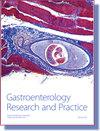Expression of TRP Channels in Colonic Mucosa of IBS-D Patients and Its Correlation with the Severity of the Disease
IF 2
4区 医学
Q3 GASTROENTEROLOGY & HEPATOLOGY
引用次数: 4
Abstract
Aim Lots of researches have endeavored to elucidate the pathogenetic mechanism of visceral hypersensitivity in order to guide the therapy of diarrhea predominant-irritable bowel syndrome (IBS-D). Transient receptor potential (TRP) channels and their role in visceral nociception have been vastly investigated. We investigated the expression of TRP channels in IBS-D colonic biopsies and its correlation with the severity of the disease. Methods Sigmoid biopsies were obtained from 34 IBS-D patients and 28 healthy controls (HCs). IBS-D was diagnosed according to Rome IV criteria. Their clinical parameters were assessed through questionnaires. Expression of TRPV1, TRPV4, TRPA1, TRPM2, and TRPM8 was evaluated with immunohistology staining. Results Expression levels of TRPV1, TRPV4, and TRPA1 in the colonic mucosa of IBS-D patients were significantly higher than those in HCs (p < 0.05), while there was no obvious difference of TRPM2 and TRPM8 expression between IBS-D patients and HCs. In addition, the expression levels of TRPV1 and TRPA1, but TRPV4, in the colonic mucosa correlated positively with the severity of diseases (r = 0.6303 and 0.4506, respectively, p < 0.05). Conclusions Expression of TRPV1, TRPA1, and TRPV4 in the colonic mucosa was enhanced in IBS-D patients compared with HCs with the former two correlated with the severity of the disease. TRP channels might be promising biomarkers in the diagnosis and estimate of the severity in IBS-D.TRP通道在IBS-D患者结肠粘膜中的表达及其与疾病严重程度的相关性
目的探讨内脏超敏反应的发病机制,为临床治疗腹泻型肠易激综合征(IBS-D)提供依据。瞬时受体电位(TRP)通道及其在内脏伤害感受中的作用已被广泛研究。我们研究了TRP通道在IBS-D结肠活检中的表达及其与疾病严重程度的相关性。方法对34例IBS-D患者和28例健康对照者进行乙状结肠活检。IBS-D是根据罗马IV标准诊断的。他们的临床参数通过问卷调查进行评估。用免疫组织学染色评估TRPV1、TRPV4、TRPA1、TRPM2和TRPM8的表达。结果TRPV1、TRPV4和TRPA1在IBS-D患者结肠黏膜中的表达水平显著高于HCs(p<0.05),而TRPM2和TRPM8在IBS-D患者和HCs中的表达无明显差异。此外,TRPV1、TRPA1和TRPV4在结肠粘膜中的表达水平与疾病的严重程度呈正相关(r分别为0.6303和0.4506,p<0.05)。TRP通道可能是诊断和评估IBS-D严重程度的有前景的生物标志物。
本文章由计算机程序翻译,如有差异,请以英文原文为准。
求助全文
约1分钟内获得全文
求助全文
来源期刊

Gastroenterology Research and Practice
GASTROENTEROLOGY & HEPATOLOGY-
CiteScore
4.40
自引率
0.00%
发文量
91
审稿时长
1 months
期刊介绍:
Gastroenterology Research and Practice is a peer-reviewed, Open Access journal which publishes original research articles, review articles and clinical studies based on all areas of gastroenterology, hepatology, pancreas and biliary, and related cancers. The journal welcomes submissions on the physiology, pathophysiology, etiology, diagnosis and therapy of gastrointestinal diseases. The aim of the journal is to provide cutting edge research related to the field of gastroenterology, as well as digestive diseases and disorders.
Topics of interest include:
Management of pancreatic diseases
Third space endoscopy
Endoscopic resection
Therapeutic endoscopy
Therapeutic endosonography.
 求助内容:
求助内容: 应助结果提醒方式:
应助结果提醒方式:


